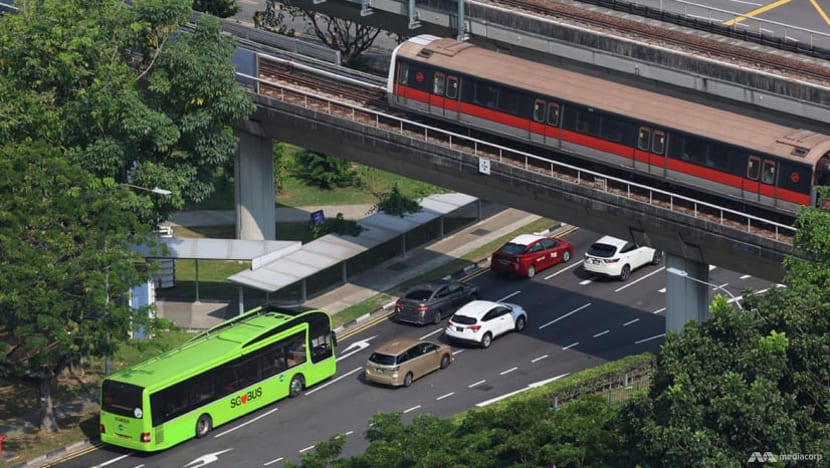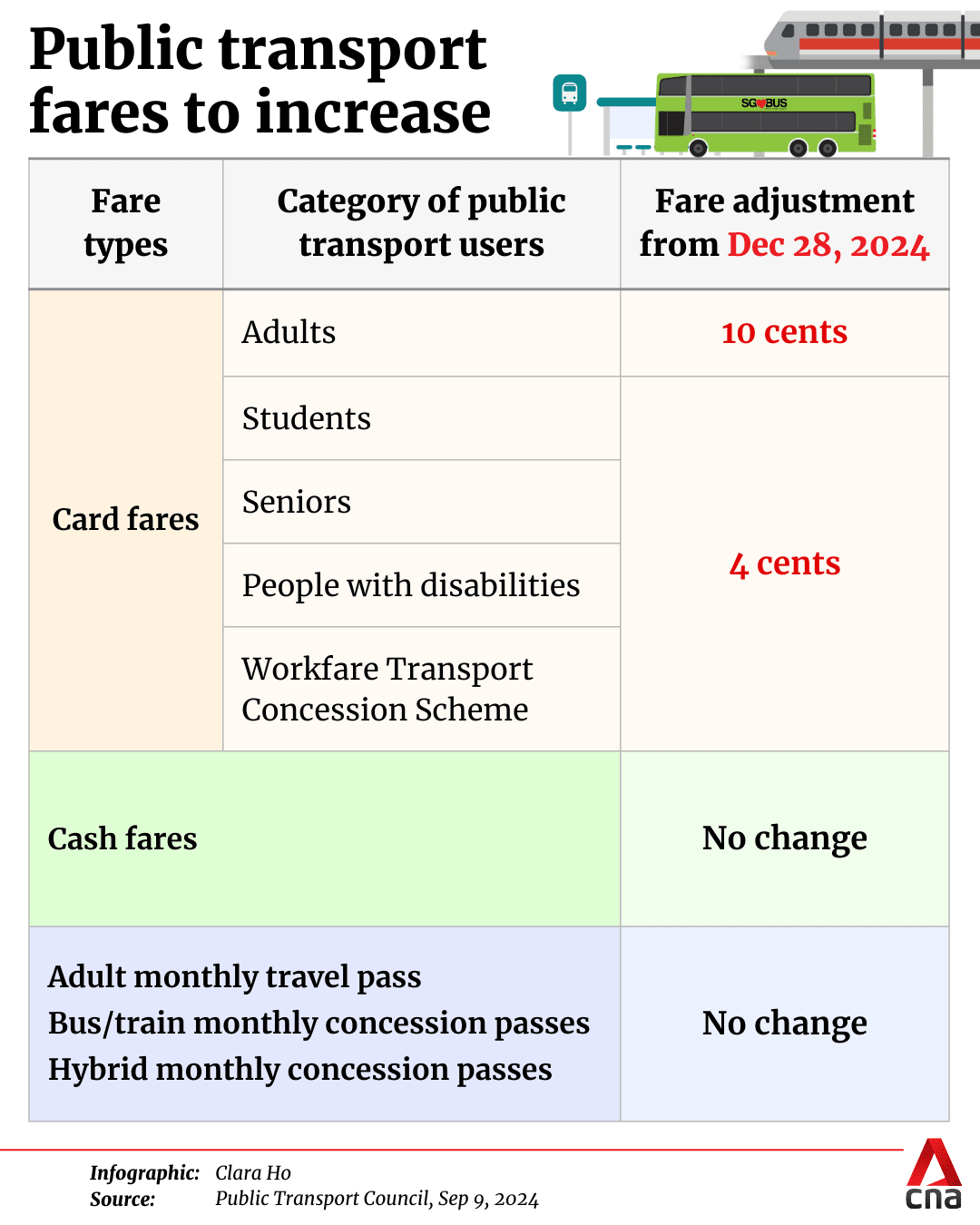Public transport fare hike: Adults to pay 10 cents more per journey from Dec 28
Overall, fares will go up by 6 per cent - less than the 7 per cent increase last year when adult fares rose by up to 11 cents for adults per journey.


This audio is generated by an AI tool.
SINGAPORE: Bus and train fares will go up by 10 cents per journey for adult commuters from Dec 28, the Public Transport Council (PTC) announced on Monday (Sep 9) after its annual fare review exercise.
For concession card holders such as students, seniors and people with disabilities, their public transport fares will increase by 4 cents per journey.
There will be no changes for people who travel with monthly passes.
Overall, fares will go up by 6 per cent - less than the 7 per cent increase last year when adult fares rose by 10 to 11 cents per journey.

Lower-income households will get public transport vouchers, which can be used to top up fare cards or buy monthly passes. The vouchers this year will be worth S$60 each, compared with the S$50 in vouchers provided last year.
The income criteria for the vouchers will also be raised and made available to households with a monthly household income per person of not more than S$1,800, up from the previous S$1,600.
An additional 60,000 households will stand to benefit from the vouchers as a result.
WHY FARES ARE GOING UP
Explaining the increase, the PTC - Singapore's regulator for public transport fares - said the decision was driven by core inflation and wage growth in 2023. But this was partially moderated by a drop in energy prices from a peak in 2022.
These three factors form part of PTC's fare adjustment formula, which derived a 3.3 per cent increase in fares based on inflation, wages and energy prices.
On top of that, there is a deferred fare increase quantum of 15.6 per cent from previous years, meaning the maximum allowable fare adjustment this round is 18.9 per cent.
The PTC then decided on a 6 per cent rise, which is less than one-third of the maximum allowable fare increase.
This is to cushion commuters from the full fare increase, with the agency saying that it understands that the cost of living remains a concern for Singaporeans.
Chairperson of the PTC Janet Ang said the reason for the deferred fare quantum of 15.6 per cent was because the agency did not grant the maximum allowable increase “as much as we can” to ease the impact on commuters.
“As a result, the deferred quantum from previous years has accumulated, due to sharp increases in energy prices in 2021 and 2022, elevated core inflation, and strong wage growth,” she said.
This is the second fare review exercise under the new fare adjustment formula that was announced in April last year.
The new formula is aimed at keeping fares affordable and less volatile, the PTC said then, as two components were fixed to reduce swings in fare changes.
HOW TO MAKE SENSE OF THE NUMBERS?
From 2018 to 2022, the fare formula was made up of five components - the core consumer price index (cCPI), a wage index (WI), energy index (EI), productivity extraction (PE) and network capacity factor (NCF).
For the new formula in place from 2023 to 2027, the last two components have been tweaked and given fixed values to reduce volatility.
Productivity extraction was changed to productivity contribution (PC) and has been fixed at minus 0.1 per cent at least until the next fare formula review, which takes place every five years.
The NCF was also changed to the capacity adjustment factor (C) and was fixed at 1.1 per cent at least until the next review.
The other three components remain unchanged.
For this year’s fare review exercise, the cCPI increased by 2.1 per cent, the WI increased by 2.1 per cent, and the EI saw a drop of 1.9 per cent.
Taken together with the fixed PC and C, it led to a fare adjustment of 3.3 per cent.
This sum has to be added to the quantum carried over from the previous fare adjustment exercises which is 15.6 per cent.
This means the maximum allowable fare adjustment is 18.9 per cent.
The PTC is granting a fare adjustment of 6 per cent, leaving a deferred fare quantum of 12.9 per cent.
BALANCING INCREASING COSTS AND KEEPING FARES AFFORDABLE
The 6 per cent fare increase will lead to a deferred fare quantum of 12.9 per cent that will be carried over to the next fare review exercise, bringing it down from 15.6 per cent.
This serves to “narrow the gap between cost and fares where we can to maintain the financial sustainability of our public transport system”, Ms Ang said.
“PTC will continue to weigh this against our objective of ensuring that public transport remains affordable.”
To cover the deferred fare adjustment, the government will provide an additional subsidy of S$250 million in the coming year.
“The additional government subsidy will help to moderate the fare increase, while still accounting for the higher costs of providing public transport,” said PTC.
Both rail operators SBS Transit Rail and SMRT Trains had applied for the full 18.9 per cent fare increase - that is, 3.3 per cent derived from inflation, wages and energy prices, plus 15.6 per cent in deferred adjustments.
They cited factors such as cost pressures from inflation as well as the slow recovery of public transport ridership.
SBS Transit’s train segment had reported a loss of “several million dollars” even with government support, while SMRT Trains recorded an operating profit of S$6.2 million with government support.
The PTC said it encourages adults and concession groups who travel frequently to consider buying monthly passes to cap their public transport expenses.
There will also be no changes to fares for commuters who pay in cash.
Editor's note: References to "trip" have been changed to "journey" after the Public Transport Council clarified that "trip" refers to a single bus or train ride while "journey" takes transfers into account.














